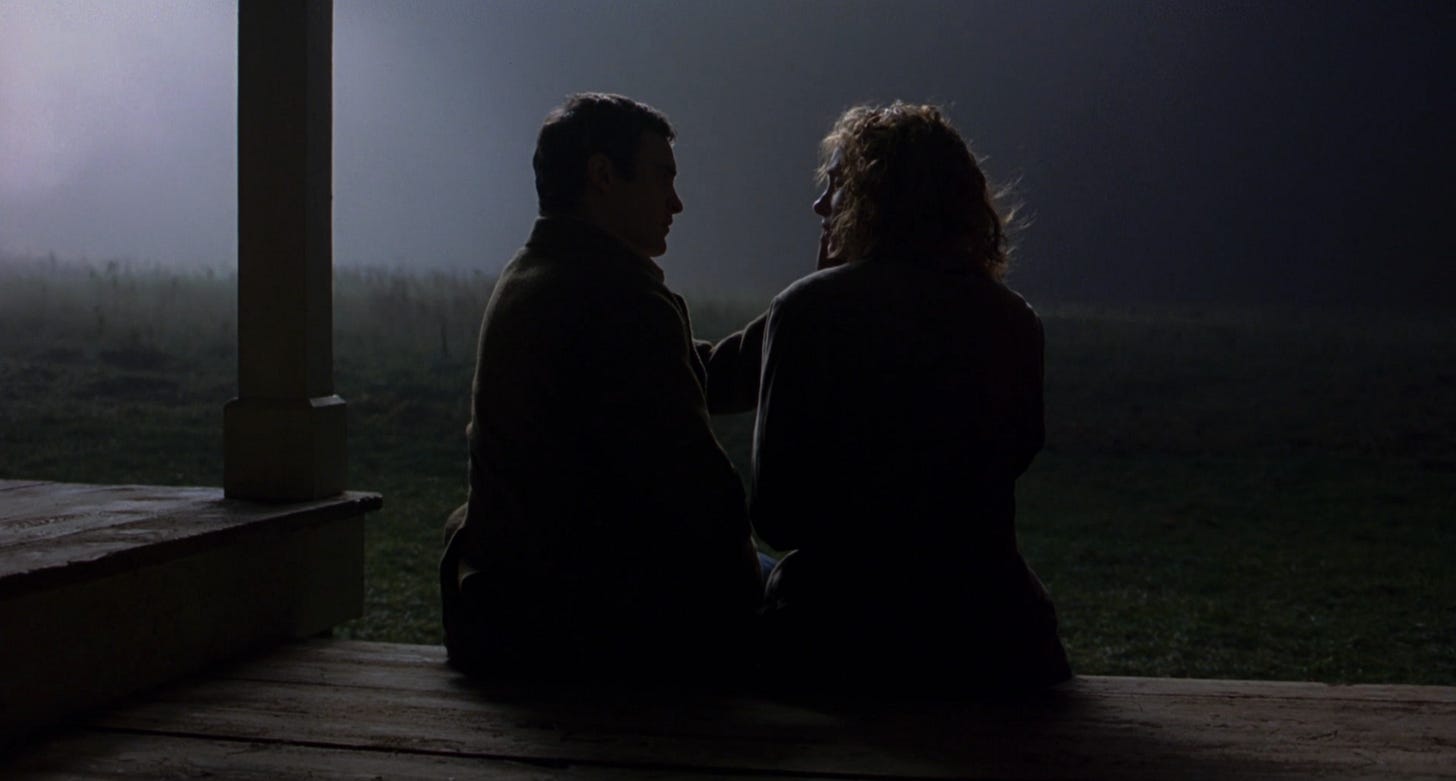100 Movies Every Catholic Should See #22: The Village (2004)
Written and Directed by M. Night Shyamalan
We live in a world that is filled with darkness, suffering and despair. A quick glance at the latest headlines is often enough to fill one with a sense of hopelessness and fear. How are we to live in such a world? How are we to carry out our faith and raise our families in such an environment? As Catholics, these questions are close to home. In M. Night Shyamalan’s film The Village, we are introduced to a community that has sought to wall themselves off from such horrors and pain to establish a new society, set in an idyllic isolation amidst the rolling hills of the wilderness. They have rejected the modern way of life in its entirety, choosing to live and dress in the manner of the 19th century. It is a utopian vision of original innocence, established to protect its inhabitants from the horrors of the outside world. We see girls in flowing dresses laughing and playing amidst the daily chores of farm life.
But, from the outset, the harmony of this life is pervaded with a sense of melancholy and unease. As we are enveloped with the mournful strains of James Newton Howard’s ethereal score, the film opens amidst the funeral of one of the children. We quickly begin to realize the implications of this way of life which the village elders have established. It is possible the child could have been saved with the proper medicine from outside. But fear grips this community, embodied by the dark forest that surrounds them on all sides. In this forest stalks a nameless horror, “those of whom we do not speak”. Masterful cinematography augments this sense of dread, contrasting the simple candlelit homes of the villagers with the ominous shadows of the forest.
Amidst this fear, there is a purity and innocence. We are introduced to Ivy Walker and Lucius Hunt, first generation villagers. They do not experience fear in the same way as the others. Lucius’s concern for his fellow villagers draws him to repeatedly ask to enter the forest to find medicine so that future tragedy can be avoided. He tells the elders that “I am certain they will let me pass. Creatures can sense emotion and fear. They will see I am pure of intention and not afraid.” He is denied each time. As the narrative progresses, Lucius and Ivy are drawn to each other through their purity and innocence. A beautiful and edifying romance blossoms.
Ivy’s character provides a palette of rich spiritual symbolism throughout the film. Blind by birth, she is attuned to things the others are not. In a particularly poignant scene, Lucius asks, “Do you not wish you had your sight?” to which she responds, ‘I see the world, Lucius Hunt. Just not as you see it” She sees with the eyes of faith and is not overcome with fear. This is particularly emphasized in one of the most powerful sequences in the film. The monsters have broken the boundary of the forest and have infiltrated the village. Amidst the clanging of alarm bells and the frenetic chaos of fleeing villagers, Ivy stands in the doorway of her house, hand outstretched into the threatening blackness of the night. The camera focuses on her hand and in the background, we see the horrifying shape of the approaching monster. Ivy does not run. She knows Lucius will come for her. Her love outweighs her fear. As the monster reaches the step, Lucius grabs Ivy’s hand and together, they make for safety.
At its heart, The Village examines the struggle between looking at the world through a lens of fear and despair and seeing it with the eyes of faith, hope and love. While noble in their intentions, the village elders lost faith in humanity and chose to withdraw out of fear. Many of them experienced real tragedy and evil, but in the village, they have chosen to bury their pain and isolate themselves in the hopes that further pains can be avoided. They attempt to preserve their way of life through secrecy and deception. Yet, the pain of and evil of the world cannot be escaped, even in the idyllic setting of the village. As Catholics, we are called to not be afraid. Our Lord encourages us in the Gospel, “Be strong and courageous. Do not be frightened, and do not be dismayed, for the Lord your God is with you wherever you go.” (John 4:18)
Ivy embraces faith, hope and love, choosing to break from the spirit of fear which has imprisoned the village. When Lucius’s life is in danger, she courageously ventures into the forest to search for medicine in the outside world. Her love for Lucius drives her on. Roger Deakin’s masterful cinematography depicts this highly allegorical journey, focusing on her hands as she feels her way through the twisted gnarly branches. Shyamalan uses this recurring motif time and again throughout the film to illustrate how Ivy views the world differently. She does not see the terror of the forest nor the ugliness of the world like the village elders do. Driven by love and guided by faith, she reaches out her hand in the hope that she will eventually find the help her beloved needs. Zooming out, we see a small figure enveloped in the darkness, hands outstretched moving through the eerie gloom. We are reminded of the 23rd Psalm:
Even though I walk
through the darkest valley,
I will fear no evil,
for you are with me;
your rod and your staff,
they comfort me.
When Ivy climbs over the outer wall, breaking through the final metaphorical barrier of fear, she is thrust into the outside world. Her upbringing in the village would have prepared her to expect everyone she encounters to be cruel. Instead, the first soul she comes in contact with is with one who is immediately sympathetic to her plight. He recognizes Ivy’s sincerity. “You have kindness in your voice. I did not expect that” she tells him. With little hesitation, he risks his own livelihood to help Ivy get what she needs for Lucius. The village elders have written off the outside world in fear. Fear is the opposite of love. Ivy flips this view on its head, and in doing so, finds that there is still good in the world. As Catholics, this is an important lesson to keep in mind as we look around and see the great evil. We need not retreat in fear. Our faith urges us to live the gospel with great love and confidence. “If God be for us, who can be against us” (Romans 8:31).
M. Night Shyamalan’s The Village is a beautiful, heartfelt film which invites us to ponder these questions. Aided by one of the most exquisite scores written in this century and a poetic canvas of cinematography laden with allegory, this film should be on every Catholic’s watchlist.







Thank you Cameron! The exchange on the front porch between Lucius and Ivy is also one of the most beautiful love scenes on film!